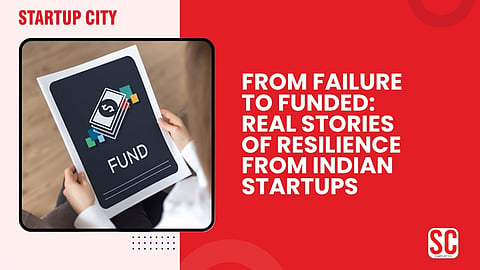

Real Stories
"Success is not final, failure is not fatal: It is the courage to continue that counts."
— Winston Churchill
You’ve poured your heart, soul, and savings into your dream startup. But instead of accolades, you get silence. Or worse—rejection. The app doesn’t scale, the funding dries up, your team walks away. You’re left wondering: Is this the end?
But what if I told you this failure is just the beginning of your greatest comeback?
In my experience writing about startups, one truth always stands tall—behind every funded startup is a story of failure, grit, and relentless resilience.
Today, let me take you inside the real-life journeys of Indian founders who stumbled, fell hard, and still stood tall — because they knew that failure wasn’t the opposite of success, but a stepping stone toward it.
The Indian startup ecosystem has exploded in the last decade, but so have the number of failures. According to a 2022 IBM study, 90% of Indian startups fail within the first five years. Sounds brutal, right?
Yet some of those very founders come back stronger, smarter, and fully funded — turning failure into fuel.
Let’s dive into a few of those stories and the powerful lessons they offer.
Kunal Shah’s first startup, FreeCharge, was a massive hit — until Snapdeal acquired it and struggled to scale it further.
But here’s the twist: Instead of riding the high forever or hiding from the hiccup, Kunal pivoted boldly and built CRED, a credit card rewards platform aimed at India’s top spenders.
“The biggest failures teach you what success never can.”
— Kunal Shah
CRED was mocked initially. “Who’ll give reward points for credit card bills?” they asked.
Today, CRED is valued at over $6.4 billion, proving once again that being underestimated can be your superpower.
Don’t fear reinvention. Use past failures as data, not drama.
Understand your user better the second time around.
Fynd co-founders Harsh Shah and Farooq Adam were rejected 52 times before Google came knocking with a $42 million investment.
They were solving for omnichannel retail — a space that few investors understood in 2013–14. At one point, they had just 3 months of runway left.
What changed?
They stuck with the problem, refined their tech, and proved real value to big retailers. Google saw the potential before others did.
"Rejections are the universe’s way of asking, ‘How bad do you want it?’”
Takeaway:
Persistence beats perfection.
You don’t need 100 yeses — just one powerful one.
Here’s the secret I’ve learned from years of interviewing founders: the best ones treat failure like feedback.
Let me break down the mindset that turns failure into funding:
Your idea may fail. That doesn’t mean you are a failure. Learn. Pivot. Evolve.
Funding often follows familiarity. The founders who bounce back fastest are the ones who nurtured investor relationships early.
One of India’s fastest-growing SaaS startups almost shut shop until they opened their books to an early-stage VC who was impressed by their honesty.
While decks raise funds, users build trust. Founders who obsess over customer pain points build solutions that attract capital — organically.
Over 1,300 Indian startups received funding in 2024, despite market corrections. (Inc42)
50+ Indian startups that failed in their first attempts successfully raised capital in their second or third ventures.
Sectors like Fintech, HealthTech, SaaS, and D2C are seeing record bounce-backs from second-time founders.
“Our first startup didn’t scale. But we reused the tech stack, solved a new problem, and raised a seed round in 6 months.”
– Ankit Mehrotra, Dineout
“When we lost our first investor, we bootstrapped and became profitable instead. That became our pitch.”
– Shruti Kapoor, Wingman (acquired by Clari)
“We had 3 failed pilots. But each one taught us how to solve a real problem better. Today, we serve 10M+ users.”
– Saurabh Aggarwal, OctaFX
1. Own Your Story
Don't hide your failure — pitch it! Investors love comeback stories. Frame it as experience, not defeat.
2. Nail Your Why, Not Just the What
Your new product must have a purpose rooted in your lived experience. That authenticity is magnetic.
3. Build in Public
Share your learnings, wins, and pivots openly on platforms like LinkedIn and X (formerly Twitter). Build trust before you pitch.
Let me ask you:
Have you faced a crushing business setback?
Did your MVP flop?
Did you run out of runway?
You’re not alone. In fact, you’re in the company of some of India’s most brilliant minds.
The difference is not in the mistake — it’s in the mindset that follows
Failure is messy, painful, and deeply personal. But it's also a gift — if you're brave enough to unwrap it.
So, the next time you hear “no” from a customer, an investor, or even your own inner critic, remember this:
Every “no” brings you one step closer to your “yes.”
Keep building. Keep believing. And one day, we’ll be reading your story in this column — from failure to funded.